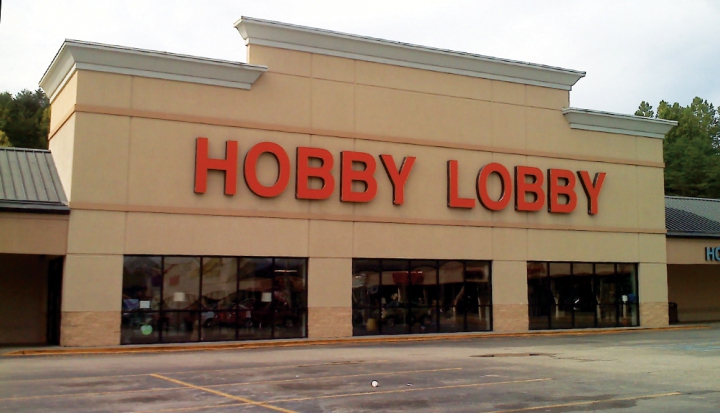Can a corporation have religious beliefs? The Hobby Lobby decision looms.
On March 29 of this year, thousands of people across the United States went on a shopping spree at Hobby Lobby, the suddenly famous craft store chain. Christened “Hobby Lobby Day” by former Republican presidential candidate Mike Huckabee, the event was meant to be a massive show of support for the $3.3 billion corporation, which had just literally had its day in court. The crowds were buying their Easter crafts and Duck Dynasty jigsaw puzzles to show their endorsement of the corporation’s claims to religious liberty.
In just a few weeks, the Supreme Court is slated to hand down its decision on Sebelius vs. Hobby Lobby, the religious liberty case heard ’round the world. The Green family, owners of Hobby Lobby, are evangelical Christians who, while they do not object to all forms of contraception, object to emergency contraception and IUDs. Both of these are on the list of required covered services in the Affordable Care Act (ACA). The Greens consider both to be abortifacients (as do the U.S. Catholic bishops). The family claims that the requirements of the ACA force them to violate their own religious convictions, therefore creating an undue burden on their religious liberty.
In this decision, the court could potentially decide whether corporations—or corporate persons, as the case may be—have the same “free exercise” rights that human persons do, and whether they have the right to ignore the law when the law violates the religious beliefs of that corporate person.
If the court rules in favor of Hobby Lobby, it would be taking a somewhat logical step following its controversial 2010 Citizens United decision, which struck down the law limiting the amount of money that corporations can give to political campaigns. The Supreme Court ruled that corporate persons are guaranteed the right to free speech, and that money is equal to speech.
Now in the Hobby Lobby case, the court could decide that, in addition to speech rights, corporations have “free exercise” rights as well. What remains unclear is how we would determine the religious beliefs of a corporate person. In any corporation a number of stakeholders must be taken into consideration, even in a privately owned company such as Hobby Lobby: certainly the owners, but also managers, employees, and customers. As Justice Anthony Kennedy asked, “The employee may not agree with these religious beliefs of the employer. [Do] the religious beliefs [of the employer] just trump?”
In January the U.S. Conference of Catholic Bishops filed an amicus brief with the court in support of Hobby Lobby and its companion in the suit, Conestoga Wood. The bishops stated: “Hobby Lobby and Conestoga are faced with a stark choice: Violate their religious beliefs or pay potentially crippling fines.”
The USCCB, however, conflates the religious beliefs of the business owners, the Green family, with those of the family’s corporation. The difficulty here is that the very structure of a for-profit corporation such as Hobby Lobby is designed to keep the business separate from the people who own its assets. The Greens are not Hobby Lobby. In fact, they could sell Hobby Lobby as a corporate entity to another family or another corporation. If they did, would the religious values of the institution remain?
During the oral arguments in March, Justices Sonia Sotomayor and Elena Kagan also asked Paul Clement, who was representing Hobby Lobby, about the potential for corporations to object to covering pharmaceuticals other than birth control. What about vaccinations? Blood transfusions? Organ donations? Medications or devices derived from pork?
This case appears to revolve around the issue of contraception. But I wonder what the uproar would be if the dispute were about vaccinations or blood transfusions—procedures that many people depend on and that some business owners might legitimately object to. If the court rules in favor of Hobby Lobby, as many court spectators predict, it may set a dangerous precedent for cases yet to come.
This article appeared in the June 2014 issue of U.S. Catholic (Vol. 79, No. 6, page 8).
Image: Flickr photo cc by Nicholas Eckhart















Add comment